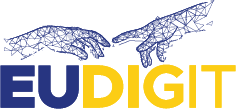You are here
General framework
Timetable of the project
Start date: May 2020 End date: March 2023
EUDIGIT aims to support the fight against the digital divide suffered by many European citizens. Yet despite public efforts, the facts are alarming: 169 million Europeans do not have basic computer skills. This acts as a real brake to slow down the fight against social exclusion. This backwardness creates differences between citizens, big cities and villages, endangers the principle of regional cohesion and may damage the feelings of belonging to the “EU project“. This fact has been noted by all EUDIGIT's cities, which express their concern about the link between digital exclusion and European Union citizenship especially among disadvantaged people.
Digital divide actually acts as an accelerator of social exclusion for not enough connected, trained and informed people who are missing “the bus of progress“. Even when “connection is good“, many citizens show poor interest for European matters; communication from the EU and Member States comes mainly online with no close contact with citizens.
This stake requires all public players to be involved in order to tackle social issues that hamper the design of “smart cities for all“. On the basis of ground-level states of play, EUDIGIT explores how cities can become actively involved in reducing the digital divide via policies and an evolution of public services tailored “with and for all citizens“, alongside a better communication with them.
Objectives of the project:
- Strengthening EU citizenship and citizens awareness,
- Contributing to reduce the digital gap in cities,
- Co-building digital policies with citizens.
Scheduled activities:
- 7 events,
- 30 workshops with NGOs and citizens,
- Setting-up of EUDIGIT's Steering Committees with NGOs and Citizens' Committees to co-build policies in all cities.
Timetable of activities
1- Marseille - Partner’s kick-off meeting and opening conference (webinar) - 7/8 october 2020.
2- Varna - 1st webinar - The youth, the digital divide and citizenship - 25/26 February 2021
3- Hamburg - 2nd webinar - The elderly, the digital divide and citizenship - 17/18 June 2021
4- Genoa - 3rd seminar - Local communication, the digital tools and citizenship - September 2021
5- Rotterdam - 4th seminar - The disabled persons, the digital divide and citizenship - January 2022
6- Cluj-Napoca - 5th seminar- The gap between rural and urban areas, the digital divide and citizenship - May 2022
7- Marseille - Final conference - September 2022
Expected outcomes:
- 5 seminars' E-books (in 7 languages),
- A declaration for cooperation between partner cities,
- Digital participation surveys,
- Target audience: 520 people; 30 000 indirectly.
- Obtain notable results on targets
Link with the Europe for Citizens programme
Consistency with the objectives of the action and of the program
Digital exclusion includes both the difficulty of Internet access and the lack of capacity to use digital tools and it can be explained by different ways: age, education level, training and place of residence.
The project deals with the question of the digital divide and the impacts on citizens’ feelings of belonging to the European Union. 250 millions of EU individuals use internet every day yet millions of others have never been online in their lives! Young people on the margins of society, adults with little education, disabled persons and the elders are particular groups that find it difficult to take advantage of new technologies.
Given that more and more everyday's tasks need to be done online, it is essential that everyone have basic computer skills so they can fully participate in our societies.
In addition, European citizens are not enough aware about their rights (cf. European Union Charter of Fundamental Rights) and opportunities granted by the European Union throughout History.
In 2010, the EU initiated an investigation into digital technology with the aim of eventually creating a vast Digital Single Market (https://ec.europa.eu/digital-single-market/).
This ambition brings together priorities as varied as the protection of personal data, skills Europeans need to take up the jobs of tomorrow and to fully enjoy their citizens’ rights.
The 2019 DESI report (https://ec.europa.eu/digital-single-market/en/desi) analyses the progress made by all Member States in their digital transformation. It is organised around five areas of analysis: connectivity, human capital, use of internet services, integration of digital technology and digital public services. The human capital factor shows considerable differences in the digital skills of citizens depending on countries.
Despite the progress made for citizens by the European Union since it was first created (free movement, consular protection, health care, student mobility...), adhesion to the “European project“has not been fully attained in 2019. This suggests that both internet information and local communication to citizens must be better coordinated and accessible.
Alongside the work undertaken by the European Union and the Member States to develop the digital society, local authorities have a role to play in reducing the digital divide among their inhabitants. Cities must act as exchange platforms on digital practices and put in place tangible actions to achieve these objectives. This approach, at local level, should result in reducing the digital divide and enabling citizens to be better informed about actions taken by the European Union.





